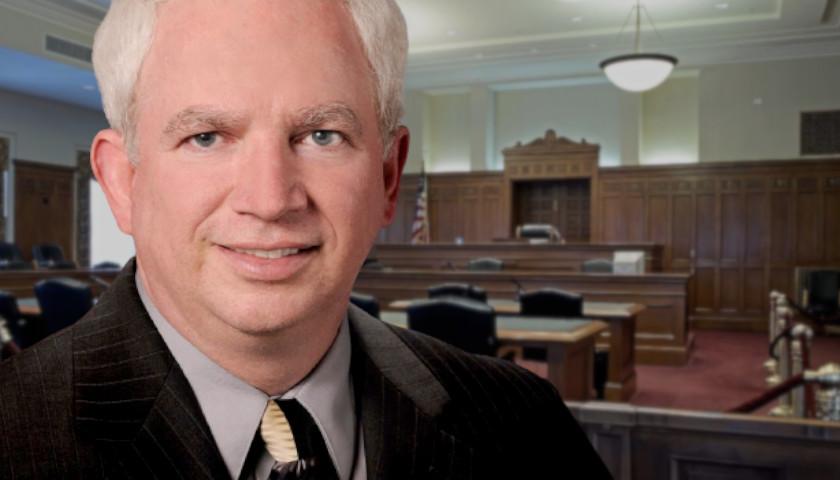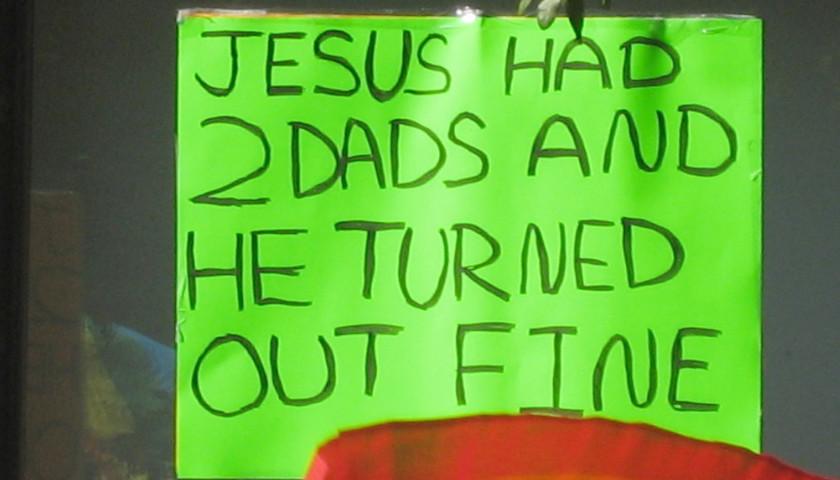Live from Music Row Friday morning on The Tennessee Star Report with Michael Patrick Leahy – broadcast on Nashville’s Talk Radio 98.3 and 1510 WLAC weekdays from 5:00 a.m. to 8:00 a.m. – host Leahy welcomed Senior Fellow at the Real Clear Foundation, Rupert Darwall to the newsmakers line to discuss his recent article and defines the design of ESG.
Leahy: We are delighted to welcome to our newsmaker line from across the pond, Rupert Darwell, a senior fellow at the Real Clear Foundation. He just released a study on capitalism, socialism, and a thing called ESG. And if you haven’t heard about it, you got to listen up. It’s very important what he’s written. Rupert, thanks so much for joining us this morning.
Darwall: It’s my pleasure, Michael.
Leahy: ESG, it sounds like a food additive, but it’s much more dangerous. Tell us, what does ESG mean? And why should we care about it?
Darwall: ESG is environmental, social, and government. It’s a form of investing. It’s meant to be for the clean, moral, pure types that want to make the world a better place. And it’s a bit of a con, really, because what it says on the outside is ESG investing, you’re doing well by doing good.
So you’re going to make more money by doing the things that are going to make the world a better place. But actually, it’s all about that at all. It’s politics by other means. It’s the politicization of business and investing. And you’ll say goodbye to those higher returns because that’s just sales chatter.
But fundamentally, it’s about turning capitalism into something very, very different. And it’s also about political power. It’s about giving financial oligarchs on Wall Street and in the big state pension funds like CalPERS in Sacramento and the Neivers New York pension funds, enormous amounts of political power of business.
Leahy: Yeah, that’s exactly it. We’ve noticed, of course, I guess the publicly traded corporations, I don’t know, 90 percent of them seem woke beyond repair. They’re always preening about some moral issue, and it’s just highly destructive it seems to me. When did this really start being a thing?
Darwall: Well, there was a phase of it, I think, in the 1970s because Milton Friedman wrote a fantastic article saying the role of business is judged by how much money it makes for shareholders. It’s about profit. Because if you’re a good business creating and innovating things in the market that customers want, you’ll do well and that kind of thing.
It kind of then went through the 80s and 90s and then receeded. But it’s really come back with a vengeance now. And you may remember, a couple of years ago, the Business Roundtable issued that 181 CEOs signed the Business Round Table statement on stakeholderism.
The businesses are meant to serve a wide variety of interests and demoting the stockholder. So it’s really come in very powerfully. And, of course, the so-called climate crisis, this existential threat to life on earth kind of thing, businesses have got to emit zero. So it’s really kind of taken business and particularly financed by storm might say.
Leahy: I don’t know what your background is other than your finance guy in London and you write about it. I’m a graduate of Stanford Business School. I have an MBA from Stanford way back when. And what I’ve noticed is the ideas that are taught in business schools today seem much more socialist at the highest level than they were when I was in school.
Tell me what you think about this. You have a generation of left-wing socialists now that are influencing these hedge funds like Black Rock and are serving on corporate boards and are in the marketing departments and the finance departments of Fortune 500 companies and they’re forcing that ideology that they’ve grown up with upon these publicly traded companies. Do I have that right or is there another element to it?
Darwall: I think that’s a very important aspect of it. I would also point to there’s also kind of a revolving door between the corporate affairs department of large corporations. At the end of the Obama administration, you saw a load of Obama administration officials exiting the federal bureaucracy and jumping into the C-suites of corporations.
For example, you mentioned Black Rock. One of the Black Rock guys is now a very senior economic advisor in the Biden administration. So it’s kind of this revolving door. It’s this intertwining of business and politics. And in my view, the business of business, the business of business is business. It’s not politics. It’s not politics by other means.
But what we’re seeing is polity of businesses becoming armed tools of political agendas, which I think is very dangerous for democracy, because these questions should be decided through the ballot box and through the Constitution.
The United States has a brilliant, perfect Constitution, if you like, of representative democracy. And the second danger to capitalism because as businesses become woke, they become less innovative and doing less of driving the things that make living standards rise and which makes capitalism the greatest economic system there’s ever been.
Leahy: The title of your study is Capitalism, Socialism, and ESG. But I look at this interconnection between the very large, publicly-traded corporations and government and politics. And to me, the ism that comes to mind is more a form of fascism. What’s your thought about that?
Darwall: Corporatism, because both socialism in its extreme form and fascism, but they both see that the political ideology must trump everything and every aspect of society. And particularly economic ones should be the tools of the state.
Yes, there is. You are absolutely right. It’s a form of corporatism. It’s very nasty. It’s unrepresentative, as I say, it’s about usurping, the Democratic prerogatives of the people through the ballot box.
Leahy: The other element of this to me, for free markets and capitalism to work, the capital markets have to work for all sizes of companies. Large companies and small companies. And of course, startup companies, small companies, entrepreneurial companies, that’s where most innovation does occur.
It seems to me that the rise of ESG, environmental, social, and governance standards among larger corporations has kind of made the capital markets much more difficult for small businesses and those that are providing innovations. Do you see that as well, or am I just looking at it from a small business lens?
Darwall: No. I think what happens is that large businesses call for large woke businesses if you like. When they embrace this agenda they say, well, our business model could be under threat from startups, therefore, because we’re doing what the politicians want and because what Democrats in Washington want, we need protection from startups.
Inevitably you get distortions in markets. You have you know what economists call rent-seeking behavior and businesses trying to protect themselves from businesses that are unencumbered by ESG and are free to perform as they want. I think you’re absolutely right. It’s a big threat to the layer of new businesses which really have driven growth and innovation.
Leahy: The other thing is to look at alternatives to ESG. Is this just a huge group think among hedge funds and Fortune 500 companies? Is there anybody in that world that you see right now that is not embracing ESG? And what consequences are they facing?
Darwall: I would say corporate CEOs are very exposed to proxy battles. If they put their head above the parapet, they’re likely to have a shareholder and stockholder revolt at the next annual general meeting. So they’re quite nervous individuals.
They have to go with the flow. The greatest economist of capitalism was Schumpeter. He wrote that an incredible book, Capitalism, Socialism, and Democracy. And in that, he described the publicly traded corporation as capitalism’s vulnerable fortresses for exactly this reason in that you have a split between ownership and control.
But I think the ESG thing because it’s such a distortion of the capital markets, there will be people who come in and contrarian investors who can make lots of money out of the fools who follow the ESG sales pattern. Because when you have people investing for non-financial reasons, they make mistakes.
They’re the easy ones you can pick off. I think there’s an aspect of it that this is set up so that more savvy investors at some point will make a great deal of money from the investors chasing the fools gold of ESG investing on the basis that they’re going to do well by doing good, which is, as I say, is complete junk.
(Commercial break)
Leahy: Rupert, you mentioned before that ESG actually doesn’t perform well financially, and it’s a bit of salesmanship, if you will, for the left. And you mentioned that perhaps some more savvy investors will come up with contrarian views.
I just sent you an email that includes some information about just such a group based here in Nashville, as it turns out, called 2nd Vote Advisors. And basically, they manage funds and they have private funds that are exchange-traded funds.
One is focused on pro-life. The other is focused on Second Amendment-type issues. They say that without 2nd Vote Advisors as a counterweight to existing asset managers, a progressive ESG agenda will continue when investors can rest assured that we will never vote proxies in support of ESG shareholder initiatives. I don’t know if you’ve heard of 2nd Vote Advisors, but it’s almost as if you predicted they would come into existence.
Darwall: It does sound like that. The smart investors will. When I say smart investors, investors that have got their feet on the ground, and they’re the best ones will see this as an opportunity. Because what will happen is that they will dump lowly rated ESG stocks, which means that they’re cheaper for others to buy.
There’s that thing that Ben Graham, the Warren Buffett guru, said, in the short term, a stock market is a voting machine, and in the long term, it’s a weighing machine. And at the end of the day, what will happen is it will be the cash flows that companies generate. The ESG investing movement is creating a massive investment opportunity for smart investors.
Leahy: But besides 2nd Vote Advisors, is there anybody promoting these contrarian options to ESG investments?
Darwall: That’s one of the things that’s needed to happen because what you’ve got is the big three index providers, ETF index providers led by Black Rock. You’ve got State Street and Vanguard. Those big three, which Black Rock is the largest asset manager in the world have gone woke.
Larry Fink is leading the charge on ESG, climate, and on stakeholderism. He has threatened encumbered management to vote against them if they don’t bow to the God of ESG. That means that if you don’t subscribe to that view of politics and that is what it is, it is essentially politics and ideology, you need to find the ETF provider who will vote your proxies the way that you want and not the way Larry Fink wants.
I think in time you will see alternative providers. The market should respond in the way that people who want politically free investing can have that demand satisfied. But as yet, I haven’t seen those ETF providers come over the horizon. America is still the most dynamic economy in the world, the freest economy in the world, and that over time that will happen. There will be a market reaction against this.
Leahy: How is it that a guy like Larry Fink, who is, in essence, a financially sophisticated left-wing ideologue, how is it that we have so many guys like that now?
Darwall: He was a bond trader who correctly spotted the diverse portfolio and index investing. These are both low costs and over time give very good performance. And he’s ridden that. And now he’s made as much money as he can ever hope to.
And he’s got the whiff of political power in his nostrils. And sitting in as chairman and CEO of Black Rock, he has the best of both worlds of having immense financial power on Wall Street and also access to every political leader he ever wants. So there is a lot of that.
There’s something that he said. Every year he writes to corporate CEOs just telling them what to think. And last year he wrote to them and said all this disclosure stuff, ESG and climate disclosure, and so forth. He says the goal cannot be transparency for transparency’s sake.
They normally say, well, the market needs more transparency and more data. Then he went on to say disclosure should be a means to achieving more sustainable and inclusive capitalism. Now, that is politics. That is pure politics and nothing to do with boosting investor returns or anything like that.
This is the guy acting as a politician wielding political power. The proxy votes that are embedded in ETF index funds, he’s stripping the proxies out of them, and he’s casting them according to his ideological prejudices.
Leahy: The founders, Alexander Hamilton, James Madison, Thomas Jefferson, didn’t agree on a lot. But one thing they did agree on that if an aristocratic manufacturing class ever arose in America, it would be bad for the constitutional Republic.
We have now this aristocratic leftwing financial class, and they have no constraints. I think what has arisen here with guys like Larry Fink is exactly the kind of aristocratic modern feudalism that Jefferson, Hamilton, and Madison would have absolutely loathed.
Darwall: I absolutely agree with that. These Wall Street oligarchs are essentially usurping, the prerogatives of the Democratic and constitutional political state. That’s exactly what’s going on. This is a parallel government that is not really accountable to anyone and certainly not accountable to voters. When Larry Fink talks about inclusive capitalism, he’s actually talking about exclusive capitalism, insider capitalism.
Leahy: Exactly.
Listen to the full interview here:
– – –
Tune in weekdays from 5:00 – 8:00 a.m. to the Tennessee Star Report with Michael Patrick Leahy on Talk Radio 98.3 FM WLAC 1510. Listen online at iHeart Radio.








